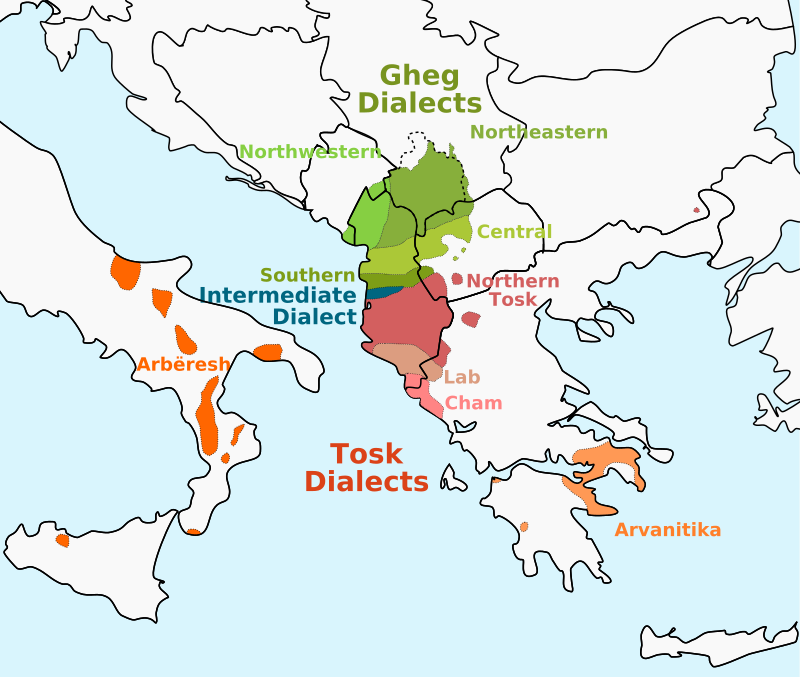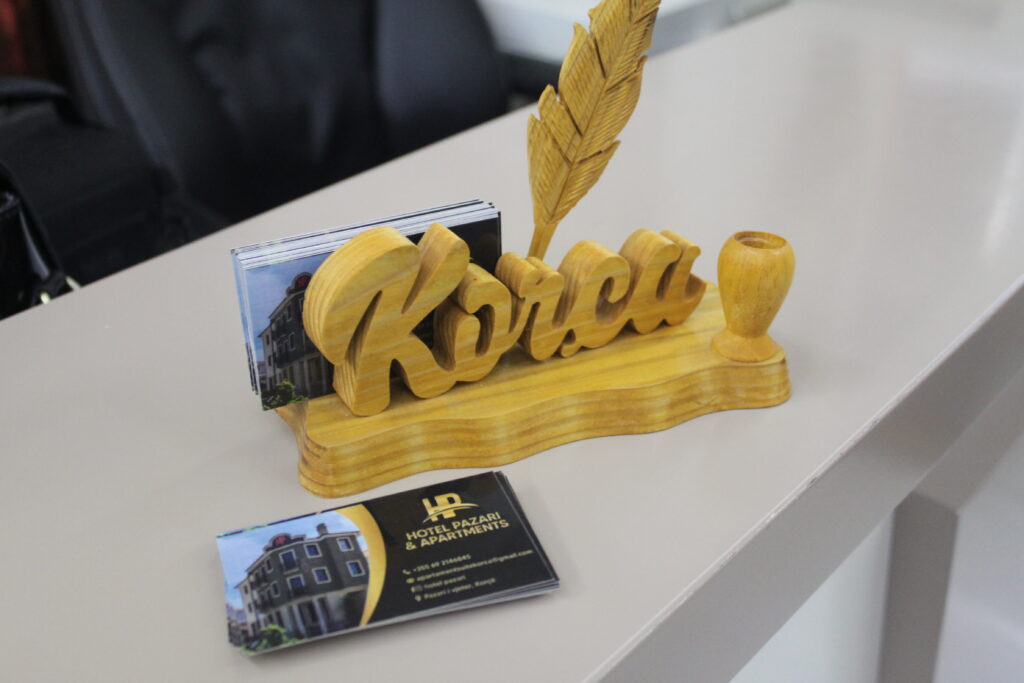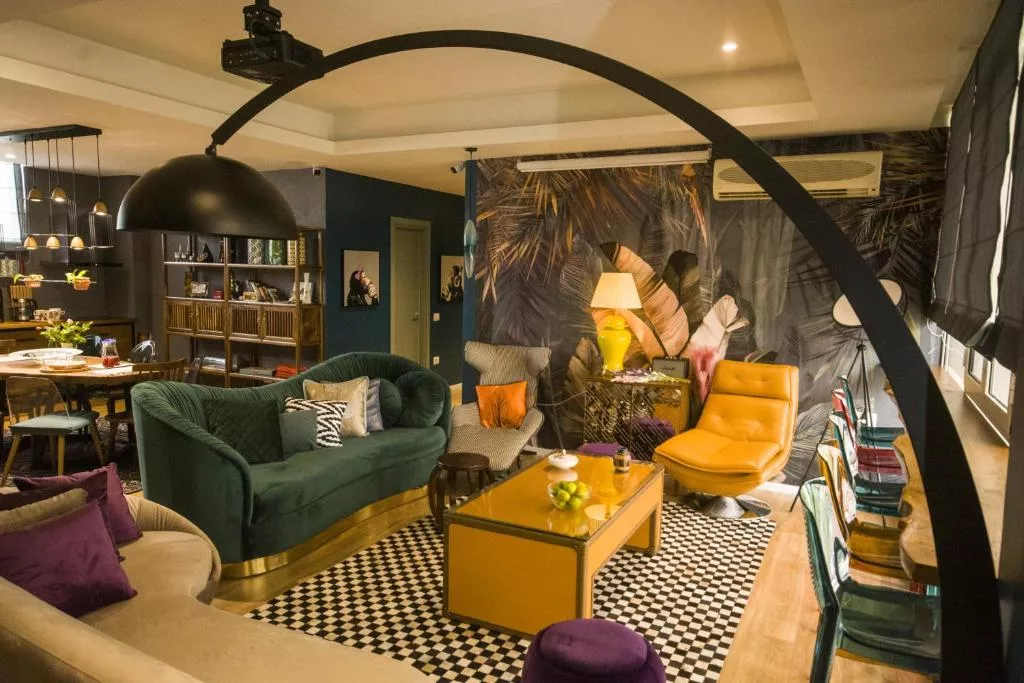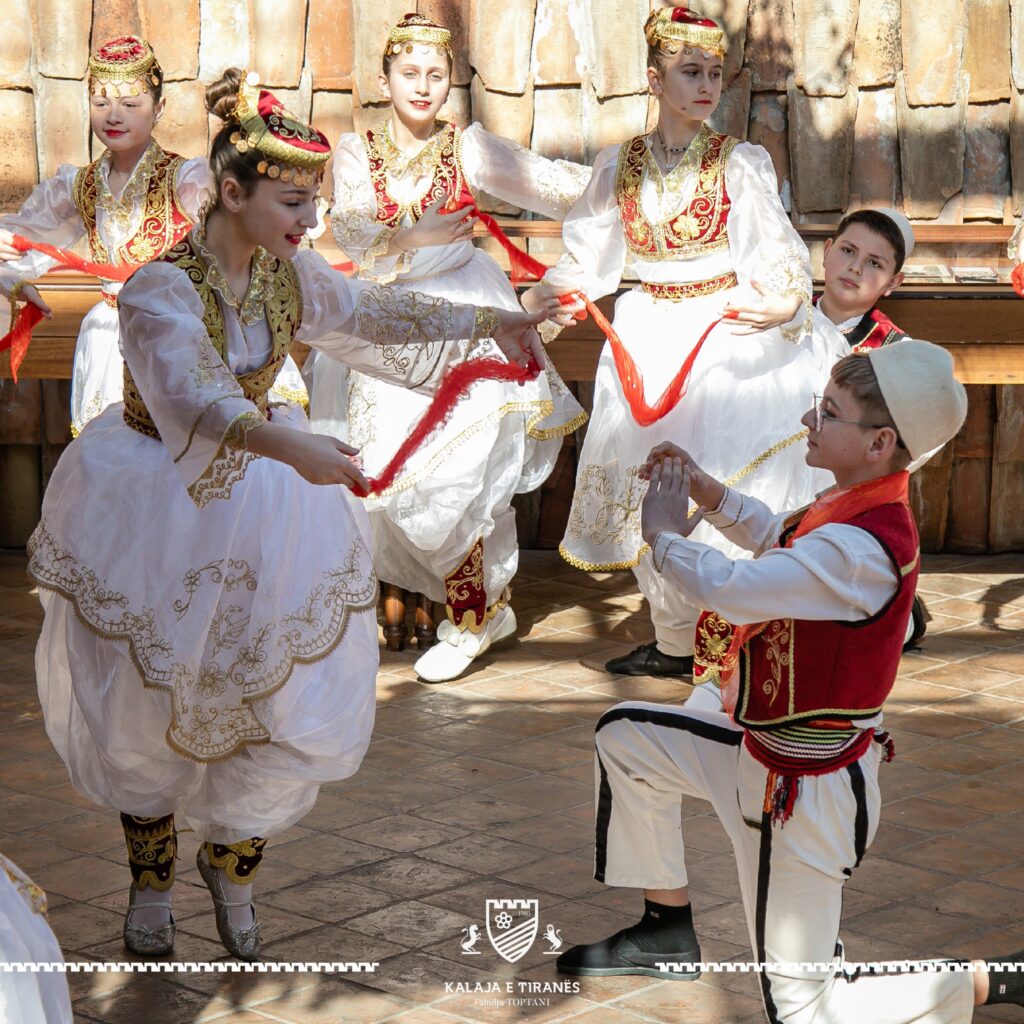Albania and Albanians have a rich cultural heritage and a unique set of traits that are recognized and admired worldwide. Some of the most notable traits of Albanians include their fierce loyalty to family and friends, their hospitality and generosity. Albanians are also known for their deep respect for tradition, they are a passionate and expressive people, with a love for music, dance, and storytelling that is woven into the fabric of their daily lives.
We have collected 30 Traits Albania & Albanians are Known For . How many of them did you already know? Check them out:
1.Red & Black Flag
It is surely one of the most beautiful flags in the world and easy to be recognised. The red and black Albanian flag is a symbol of the country’s rich history and strong national identity. The red color represents bravery, strength, and valor, and the blood of the people who died for the country’s freedom, while the black color represents the struggles and hardships the Albanian people have endured throughout their history. The flag has a unique double-headed eagle in the center, which is also a symbol resistance and dominion. The design of the flag has remained largely unchanged since it was first adopted in 1912, and it is flown with great pride throughout the country and by Albanians around the world.

2. The unique Albanian Langage
No other language like Albanian! It is not similar to greek, it is not similar to macedonian! It is a unique and fascinating language with a rich history dating back to ancient times. It is the official language of Albania, Kosovo, and parts of North Macedonia and Greece. Albanian is considered to be an Indo-European language, but it has its own distinct grammar and vocabulary that sets it apart from other languages in the family. Additionally, Albanian has a complex system of noun declension that is unlike any other language. Despite the challenges of learning Albanian, the language is celebrated by Albanians for its unique beauty and importance to their cultural identity.

3. Calling Albania Shqiperia
We call our country “Shqipëria,” which means “Land of the Eagles.”
The name has originated from the ancient Illyrian tribe that inhabited the region, whose emblem was an eagle (shqipe) . The use of “Shqipëria” reflects the strong sense of national identity and pride that Albanians have for their country. The name is also a reminder of the struggles and sacrifices that Albanians have made to preserve their independence and sovereignty throughout history. Today, “Shqipëria” is a term that is cherished by Albanians both within the country and in the diaspora, serving as a symbol of their shared cultural heritage and unity.

4. Two dialects
Albanian might sound different from one person to another, that’s because of its two different dialects: Gheg and Tosk. Gheg is spoken in northern Albania, Kosovo, Montenegro, and parts of Serbia, while Tosk is spoken in southern Albania and parts of North Macedonia. The two dialects differ in pronunciation, grammar, and vocabulary, but they are mutually intelligible, meaning that speakers of one dialect can understand the other. Despite the differences, both Gheg and Tosk are equally important to the Albanian national identity, and efforts have been made to preserve and promote both dialects through education and cultural programs.

5. Beautiful Women
You must visit the country to see for yourself, but everyone agrees at this point: Albanian women are really beautiful! They are known for their striking features, including olive skin, dark hair, and captivating eyes. They are often described as strong, independent, and confident, with a deep sense of pride in their cultural heritage. Albanian women are also known for their traditional values, including a strong emphasis on family and hospitality. Many Albanian women have achieved success in various fields, including entertainment, politics, and business.

6. Religion Tolerance
Even though the country is in a changing phase related to faith and religion, Albania continues to be known for its religious tolerance and harmony. The country has a long tradition of religious diversity, with the majority of the population being Muslim, followed by Orthodox and Catholic Christians. Despite historical tensions between different religious groups, Albania has maintained a remarkable level of religious harmony throughout its history. Albanians are known for their respect and tolerance for different religious beliefs, and interfaith marriages and friendships are common. This religious tolerance is reflected in the Albanian constitution, which guarantees freedom of religion for all citizens. Today, Albania stands as a shining example of a country where people of different faiths can coexist peacefully and with mutual respect.

7. Code of Besa
The Code of Besa is a centuries-old Albanian tradition of honor and hospitality that remains an important part of Albanian culture to this day. Besa is a word that roughly translates to “faith” or “keeping one’s promise,” and it embodies the idea of a moral obligation to help others in need, regardless of the circumstances. The code of Besa is deeply ingrained in Albanian society and is considered a sacred tradition. It is often cited as an example of the strong sense of community and mutual support that characterizes Albanian culture. Even during times of conflict or hardship, the code of Besa serves as a reminder of the importance of human compassion and solidarity. Today, the code of Besa continues to be a source of pride and inspiration for Albanians around the world.

8. Gjergj Kastriot Skanderbeg -National Hero
Gjergj Kastrioti Skanderbeg is globally known name and the national hero and symbol of Albanian resistance against foreign invaders. Skanderbeg was born in 1405 and spent much of his life leading a rebellion against the Ottoman Empire, which had conquered much of the Balkans. Skanderbeg was a skilled military strategist and leader, and his resistance movement was able to hold off Ottoman forces for over 25 years. Skanderbeg’s legacy has had a profound impact on Albanian culture and identity, and he is revered as a symbol of courage, independence, and national pride. Skanderbeg’s image can be found throughout Albania, and his name is often invoked in speeches, songs, and literature as a reminder of the country’s rich history and enduring spirit. Today, Skanderbeg remains a national hero and an inspiration for Albanians around the world.

9. Value on families and ethnic heritage
Family and ethnic heritage are highly valued by Albanians, and they play a central role in Albanian culture and identity. Albanians place great importance on the concept of the extended family, and many families live in close proximity to one another, with grandparents, aunts, uncles, and cousins playing an active role in each other’s lives. The Albanian language contains many words and expressions related to family, and family gatherings and celebrations are an integral part of Albanian life. Similarly, ethnic heritage is an important aspect of Albanian identity, with many Albanians taking great pride in their cultural traditions and customs. Albanians have a strong sense of national identity, but they also place great value on regional and local identities, with each region and community having its unique customs and traditions. Overall, the importance of family and ethnic heritage reflects the deep-rooted sense of community and solidarity that characterizes Albanian culture.

10. The communism era & Enver Hoxha
The communism era in Albania lasted from 1944 to 1991 and was characterized by a repressive regime led by Enver Hoxha. Hoxha was a dictator who ruled Albania with an iron fist, implementing a Stalinist model of communism that sought to eliminate all dissent and opposition. Under Hoxha’s leadership, Albania became one of the most isolated and impoverished countries in Europe, with severe restrictions on personal freedom, human rights, and economic activity. Hoxha’s regime was known for its harsh punishments for even minor offenses, including imprisonment, torture, and execution. Despite the regime’s repression, Albanians continued to resist and push for democratic reforms, and in 1991, the communist government was overthrown. Today, Albania has made significant progress towards building a modern democracy and economy, but the legacy of the communist era still lingers in many aspects of Albanian society.

11. 750,000 War Bunkers
During the communist era under Enver Hoxha’s rule, Albania constructed an extensive network of over 750,000 concrete bunkers across the country. These bunkers were built as a defense against a potential invasion from foreign powers, but they also served as a symbol of Hoxha’s paranoia and isolationist policies. After the fall of communism, many of the bunkers were left unused and abandoned, but in recent years, some have been repurposed for various uses, including as tourist attractions, storage facilities, and even as homes. The bunkers have become a unique feature of the Albanian landscape, and their sheer number has led to them being described as a “bunkerization” of the country. While the bunkers remain a reminder of Albania’s tumultuous past, they have also become a source of fascination and intrigue for both locals and visitors alike.

12. Once the first Atheist country in the world
Albania was once considered the first officially atheist country in the world. This status was a result of the communist regime under Enver Hoxha, which sought to eradicate religion from Albanian society. Under Hoxha’s leadership, religious institutions were shut down, and religious practices were strictly forbidden. Churches, mosques, and other places of worship were either destroyed or repurposed for secular use. Religious leaders were persecuted, and many were imprisoned or executed. Despite the regime’s efforts, some Albanians continued to practice their faith in secret, and after the fall of communism, religion began to re-emerge in Albanian society.

13. Millions of Migrant People
There’s no chance to not find Albanians everywhere you go. No matter how far it is.There are millions of Albanian migrants living throughout the world, with significant populations in Europe, North America, and Australia. The reasons for Albanian migration are varied, including economic, political, and social factors. Many Albanians left the country during the communist era, seeking better opportunities and freedom abroad. Others have left more recently, looking for work or better living conditions. Despite living in different countries, Albanian migrants often maintain strong ties to their homeland, and many continue to speak Albanian and practice Albanian traditions and customs. The Albanian diaspora has made significant contributions to their host countries, while also helping to support their families and communities back home.

14. Hospitality
Albanians are known for their hospitality and welcoming nature towards visitors, which makes Albania a popular tourist destination. Traditional Albanian hospitality includes offering food and drink, engaging in lively conversation, and showing interest in the guest’s well-being. Visitors often comment on the warmth and kindness of the local people, which has helped to promote tourism in the country. In Albanian culture, guests are considered a blessing, and hosts will often go out of their way to ensure their guests are comfortable and well taken care of. The culture of hospitality is deeply ingrained in Albanian society and has been passed down through generations, making it a source of pride for many Albanians.

15. Reasonable Prices
Albania is known for offering reasonable prices for tourists, making it an attractive and affordable destination. Compared to other European countries, the cost of living in Albania is relatively low, meaning that accommodation, food, and transportation are all reasonably priced. This affordability, combined with Albania’s stunning natural beauty and rich cultural heritage, has made it an increasingly popular tourist destination. Visitors can enjoy a range of experiences in Albania, from exploring historic sites and museums to relaxing on pristine beaches or trekking through the rugged mountains. Additionally, the Albanian hospitality and welcoming culture ensure that visitors receive excellent value for their money, with locals going out of their way to ensure visitors have a memorable and enjoyable stay.

16. Valle popullore- The folk dance
Valle Popullore, or folk dance, is an essential aspect of Albanian culture and tradition. The dance is performed to traditional Albanian music, which varies depending on the region and the occasion. The dance is often performed during celebrations such as weddings, religious holidays, and national festivals, and it involves a series of steps and movements that are designed to showcase the dancers’ grace and skill. Albanian folk dance is often performed in groups, with dancers holding hands and moving in unison, creating a beautiful and intricate display of movement and music.

17. The country with no trains
It might sound strange for a country in the heart of Europe but as of 2023, there are no functioning passenger trains in Albania. This is due to the country’s outdated railway infrastructure and lack of investment in the sector. Although Albania does have railway tracks, they are primarily used for transporting goods rather than passengers. Instead, transportation in Albania is primarily provided by buses and private cars, which are widely available and affordable. While the lack of passenger trains may be seen as a disadvantage for some travelers, it has also encouraged the development of an extensive bus network, making it easy and convenient to travel throughout the country.

18. The coffee culture
Everything starts and ends with a cup of coffee. The Coffee Culture is an integral part of daily life in Albania, and it plays an important role in socializing and connecting with friends and family. Albanians are passionate about their coffee and take great pride in preparing and serving it to their guests. The traditional way of making coffee in Albania is by using a small copper pot called a “xhezve,” which is filled with finely ground coffee and water and then heated on a stove. The resulting coffee is rich and aromatic, and it is often served with sugar and a glass of water. Albanians typically enjoy their coffee slowly, savoring the flavor and using it as an opportunity to catch up with friends and family. Coffee shops and cafes are prevalent throughout the country, and they provide a cozy and welcoming environment for locals and visitors alike.

19. Movie “Taken” & Marco from Tropoja
Albania gained international recognition through the popular movie “Taken”, which featured a retired CIA agent played by Liam Neeson who travels to Albania to rescue his daughter from human traffickers. Even thought the Albanian characters are based on negative stereotypes, this movie was a reminder to everyone to have a look on today’s Albania and actually discover a whole new reality.

20. Stubborn people
Like any other culture, Albanians are known for certain personality traits, one of which is their perceived stubbornness. Albanians are a proud people who value their independence. They are known for their strong will and determination, which can sometimes be interpreted as stubbornness. However, this trait can also be seen as a positive one, as it has helped Albanians persevere through difficult times and maintain their cultural identity despite various challenges.

21. The Accursed Mountains
The Accursed Mountains or Bjeshket e Namuna, are a rugged range of peaks and valleys in northern Albania. This area is a paradise for nature lovers, offering crystal-clear rivers, alpine meadows, and vast forests teeming with wildlife. The highest peak is Mount Jezerca, which rises to an elevation of 2,694 meters. Visitors can experience the local culture and hospitality in the traditional villages and towns of the region. Hiking, trekking, and mountaineering are popular activities, with several well-marked trails catering to different skill levels.

22. Many UNESCO Heritage Towns
Albania is a country that boasts numerous UNESCO World Heritage sites, among which are several charming historic towns that highlight the country’s cultural richness. These towns, including Berat, Gjirokastra, Butrint, Kruja, Vlora, and Shkodra, are renowned for their stunning architecture, ancient sites, and preserved old town districts. For tourists, these UNESCO-listed towns are a must-visit, offering a unique opportunity to delve into Albania’s rich past and present. With their fascinating history, cultural heritage, and scenic beauty, these towns provide a compelling reason to visit Albania and explore the country’s hidden gems.

23. “Maldive looking” beaches
The Albanian Riviera boasts Maldive-looking beaches such as Dhërmi, Jale, and Ksamil, where the water is a breathtaking shade of turquoise and the sand is as soft as powder. Visitors can also enjoy a wide range of water sports and activities such as snorkeling, kayaking, and scuba diving. The best part is that Albania’s beaches are relatively undiscovered, meaning that you can enjoy the sun, sea, and sand without the crowds. If you’re looking for a relaxing beach holiday in a stunning and affordable destination, Albania’s Maldive-looking beaches should definitely be on your list.

24. The Albanian “Thailand” – Shala River
Nestled in the heart of the Albanian Alps, the Shala River is often referred to as the Albanian “Thailand” due to its stunning turquoise waters and breathtaking natural beauty. The river is known for its crystal clear waters that are perfect for swimming, rafting, and kayaking. The surrounding landscape is equally stunning, with soaring mountains, cascading waterfalls, and lush green forests. Visitors can also explore the nearby Valbona Valley National Park and hike to some of the most scenic vistas in the country. The Shala River is a true gem of Albania, offering visitors a unique opportunity to explore the country’s wild and unspoiled natural beauty.

25. Byrek and other traditional food
When it comes to traditional Albanian food, one dish that you simply can’t miss is byrek. Byrek is a savory pastry made with phyllo dough and filled with a variety of ingredients such as spinach, cheese, meat, or potato. It’s typically served as a snack or breakfast food and is widely available throughout the country. Another must-try Albanian dish is tave kosi, a hearty casserole made with lamb, yogurt, and rice. Other popular dishes include fërgesë, a delicious mix of peppers, onions, tomatoes, and cheese, and qofte, a type of meatball made with beef or lamb. Albania is also known for its fresh seafood, particularly along the coast, where you can find grilled octopus, mussels, and sea bass. Whether you’re a foodie or simply looking to try some traditional Albanian cuisine, there’s no shortage of delicious options to choose from.
26. Raki as the National Drink
You can’t say you were in Albania if you didn’t try raki, the national drink of Albania, a popular alcoholic beverage that’s enjoyed throughout the country. It’s a clear, strong liquor made from distilled grapes, and it’s often served as an aperitif before a meal. Raki is typically enjoyed in small shot glasses, and it’s usually served alongside traditional Albanian dishes like byrek and tave kosi. The drink is known for its potent aroma and its smooth, slightly sweet taste. Albanians are proud of their raki, and it’s often seen as a symbol of hospitality and generosity. It’s not uncommon for Albanians to offer guests a glass of raki as a way of welcoming them into their homes.

27. Anjeze Bojaxhiu known as Mother Teresa
Mother Teresa of Calcuta was once Anjeze Bojaxhiu of Albania. Her family home is located in Tirana and is open to any visitor. She remains definitely one of our country’s most famous and beloved figures worldwide. Here’s a list of 30 Most Famous Albanians In The World.

28. Famous Pop Stars
Some of the most famous Albanian pop stars include Rita Ora, Dua Lipa, Bebe Rexha, and Era Istrefi. These artists have achieved global success and have put Albania on the map when it comes to the music industry. They have also helped to promote Albanian culture and traditions to a wider audience, and have inspired many young Albanians to pursue their dreams of becoming musicians themselves. With their unique blend of Albanian and Western influences, Albanian pop stars have created a distinct and vibrant music scene that continues to thrive and evolve.

29. Special Love for Mercedes Cars
Well, it’s true what the first cars that entered Albania were Mercedes, but since then, Albanians love for cars have spread to other brands too. Nowadays you can witness the most expensive ones in the streets, from Volswagen to Teslas.

30. Many Outsourcing Call Centers
Albania has emerged as a hub for outsourcing call centers, providing a range of services to companies across the world. This has been driven by a number of factors, including the country’s young, well-educated workforce and its favorable location, which allows for easy communication with both Europe and the United States. Many Albanian call centers offer multilingual support, making them an attractive option for businesses looking to expand their operations globally.




